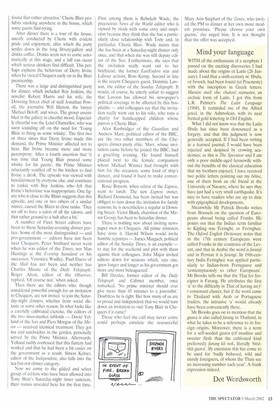Mind your language
WITH all the enthusiasm of a neophyte I passed on the exciting discoveries I had made about the origins of Latin (26 January). I said that a sixth-century BC fibula, or brooch, had been found (at Praeneste) with the inscription in Greek letters: Manios: med: vhe: vhaked: numasioi, an archaic form of Latin. I got this from L.R. Palmer's The Latin Language (1968). It reminded me of the Alfred jewel, in the Ashmolean. with its neat fretted gold lettering in Old English.
What I did not know was that the Latin fibula has since been denounced as a forgery, and that this judgment is now generally accepted. If I had been writing in a learned journal, I would have been rejected and despised by crowing academics; as this is The Spectator and I am only a poor middle-aged housewife without the benefits of the classical education that my brothers enjoyed, I have received two polite letters pointing out my betise, one of them from an old friend at the University of Navarre, where he says they have just had a very small earthquake. It's nice to have readers who are up to date with epigraphical developments.
Meanwhile Mr Patrick Brooks writes from Brussels on the question of Europeans abroad being called Franks. He points out that the Indian term familiar to Kipling was Feringhi, or Feringhee. The Oxford English Dictionary notes that in the 17th century Europeans were called Franks in the countries of the Levant, and that in Arabic the word is faranji and in Persian it is farangi. In 19th-century' India Feringhee was applied particularly to Indian-born Portuguese and 'contemptuously to other Europeans'. Mr Brooks tells me that the Thai for foreigner is Farang. He attributes the first 'a' to the difficulty in Thai of having an fr consonant cluster, but if the word came to Thailand with Arab or Portuguese traders, the intrusive 'a' would already have been conveniently there.
Mr Brooks goes on to mention that the guava is also called farang in Thailand, in what he takes to be a reference to its foreign origins. Moreover, there is a term for a self-seeded guava (of mushier and sweeter flesh than the cultivated kind preferred): farang kii nok, literally 'birdshit guava'. By extension this has come to be used for 'badly behaved, wild and unruly foreigners, of whom the Thais see an increasing number each year'. A frank expression indeed.
Dot Wordsworth














































































 Previous page
Previous page